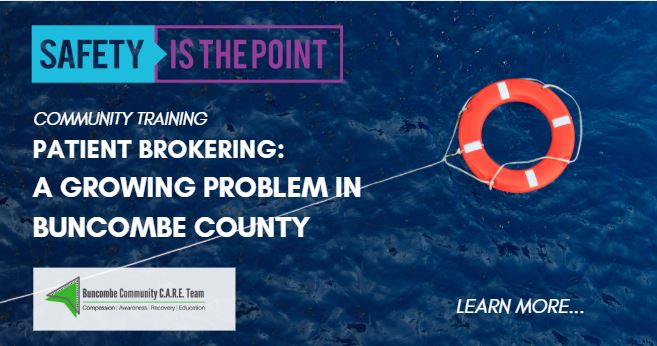This news item expired on Tuesday, March 17, 2020 so the information below could be outdated or incorrect.

Patient brokering is a range of activities in which a “consultant” is paid kickbacks by a substance use treatment center or sober living home to recruit patients to their services. This often times results in a cycle of dangerous behavior that endangers people who are seeking recovery services.
Buncombe County Health and Human Services CARE Team, in collaboration with David Cunningham from Cumberland Heights Drug and Alcohol Treatment Center, presents an important new training on a predatory practice targeting clients in need of or engaged in substance use services. Whether you are a case manager, concerned family member, insurance agent, or social services supervisor, this training is for you. Come learn the signs to protect our community from these agents. Please respond here if you would like to attend.
What is Patient Brokering?
In order to maximize their paycheck, patient brokers will go to great lengths to “recruit”, including following individuals to 12 step meetings, harm reduction services, Methadone clinics, etc. They will also usurp domain names and pay for a fake online advertisement to get the top spots in Google searches for “treatment”.
In the recruitment process, patient brokers may give individuals who they know are struggling to stay off of illicit drugs- cash on hand, airfare to a far away city where “treatment” lies, and sometimes even give them drugs to keep them in the cycle for future kickbacks.
Treatment centers and sober living homes, in turn, take these clients in for “treatment” and deliver any range of services. Typically, these entities engage in excessive billing for services, many of which are not needed. For example, they may bill a partial hospital (PHP) level of care for a few hours of clinical hours a week, or subject clients to several drug screens a week just to get reimbursement funds. Often, a patient broker will work together in concert with a treatment center and sober living home to refer “in-network”, to receive more kickbacks.
Patient brokering is a federal crime, but because there is no NC state statute, it is very difficult to prosecute in North Carolina. In addition, law enforcement agents are precluded from following individuals to and from treatment.
- Does the treatment offered seem “too good to be true”?
- Are they offering to pay for airfare, or health insurance?
- Are they offering to waive all copays and deductibles?
- Are they offering cash on hand for entering treatment?
- Are they offering free housing, outside of an inpatient program?
Join Us on December 10th!
Come hear more about how you can recognize the signs of this predatory practice, and fight patient brokering from the leader of a nonprofit drug and alcohol treatment center in Nashville, Tennessee who has fought hard to keep patient brokers away from his clients.
If you know someone engaged in patient brokering, here are some numbers that you can call:
- Shane Guyant, Deputy Commissioner of North Carolina’s State Insurance Fraud Bureau @ (919) 733-7434
- If the organizations that they refer to claim to provide medical services, you can also report them to the North Carolina Medical Board @ (919) 326-1100
- If the individual who is brokered has private insurance, call the fraud division of that company immediately to report suspicious activity
Please RSVP here.
Training will be held at Buncombe County Health and Human Services
40 Coxe Ave. Room C031B (Downstairs)
Tuesday, December 10th
3:00PM-5:00PM
Please Join Us in protecting vulnerable members of our community and their families! We are SAFER TOGETHER!